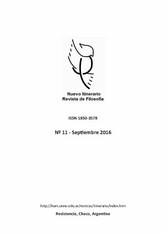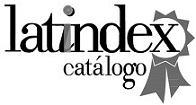The boundaries between philosophy and religion in Ricoeur’s thought. A dialogue on the problem of evil
DOI:
https://doi.org/10.30972/nvt.2017564Keywords:
Biblical Hermeneutics, Forgiveness, Freedom, Regeneration, KerygmaAbstract
This paper offers an analysis of the ideas of freedom, evil and forgiveness in order to cross the border between the philosophical discourse itself and the religious or kerygmatic discourse in Paul Ricoeur’s work. By passing through these ideas, we will be able to distinguish three possible forms of contact between philosophy and religion. Thus, we will first talk about an approximation; then, we will try to define the border or separation that Ricoeur establishes between the two based on the question of hermeneutics. Finally, we will raise the possibility of a forgetting of borders brought about by the problem of forgiveness and fault. Having as its main axis the problem of evil in the thought of the French philosopher, our main thesis will be to argue that with the proposal of difficult forgiveness culminates a dialogue between philosophy and religion in which the boundaries between one and the other vanish.
References
Agís Villaverde, M., & Ríos Vicente, J. (Eds.). (2003). Pensadores en la frontera: Actas VI Encuentros internacionales de Filosofía en el Camino de Santiago. Universidade da Coruña, Servicio de Publicacións.
Badiou, A. (2012). L’aventure de la philosophie française : Depuis les années 1960. La Fabrique éd.
Begué, M.-F. (2002). La memoria apaciguada. Escritos de Filosofía, 41-42, 225-234.
Borne, É., Ricoeur, P., & Guitton, J. (1968). DIOS, HOY. Kairós teología.
Dosse, F. (2013). Paul Ricoeur: Los sentidos de una vida: 1913-2005 (P. Corona, Trad.; Primera edición en español). Fondo de Cultura Económica.
Ferrara, R. (2006). Pul Ricoeur (1913-2005): Sus aportes a la Teología. Revista Teología, XLIII(89), 9-48.
Fiasse, G. (2008). Forgiveness: Forgiveness and the Refusal of Injustice. Proceedings of the American Catholic Philosophical Association, 82, 125-134. https://doi.org/10.5840/acpaproc2008829
González, M. (2022). El perdón ricoeuriano entre la hermenéutica filosófica y la hermenéutica bíblica. Actas de las VII Jornadas Internacionales de Hermenéutica, 21-26. https://proyectohermeneutica.sociales.uba.ar/actas-de-las-vii-jornadas-internacionales-de-hermeneutica-realizadas/
Grondin, J. (2019). Paul Ricoeur. Herder.
Hall, W. D. (2007). Paul Ricoeur and the poetic imperative: The creative tension between love and justice. State university of New York press.
Lythgoe, E. (2017). Los límites del perdón ricoeuriano desde la perspectiva argentina. En G. Marcelo, C. C. Arias, P. Lavelle, & T. D. Moratalla, Ricœuriana 1: A atualidade de Paul Ricœur numa perspetiva Ibero-Americana (1.a ed., pp. 145-172). Imprensa da Universidade de Coimbra. https://doi.org/10.14195/978-989-26-1516-5_4
Marcelo, G. (2015). Del conflicto a la conciliación y viceversa: Algunas notas acerca de la dialéctica de Ricoeur. Universitas Philosophica, 31(63). https://doi.org/10.11144/Javeriana.uph31-63.ccdr
Orth, S. (2003). Entre Filosofía y Teología: Paul Ricoeur y el perdón. En M. A. Agís Villaverde & V. J. Ríos (Eds.), Pensadores en la frontera: Actas VI Encuentros internacionales de Filosofía en el Camino de Santiago (pp. 229-237). Universidade da Coruña, Servicio de Publicacións.
Ricœur, P. (1955). Histoire et vérité. Éd. du Seuil.
Ricoeur, P. (1968). Ciencias humanas y condicionamiento de la fe. En DIOS, HOY. Kairós teología.
Ricoeur, P. (2003). La memoria, la historia, el olvido (A. Neira, Trad.; 2. ed.). Ed. Trotta.
Ricoeur, P. (2007). Autobiografía intelectual. Nueva Visión.
Ricoeur, P. (2009). Amor y justicia (1a ed. en español). Siglo Veintiuno Editores.
Ricoeur, P. (2009). Fe y filosofía: Problemas del lenguaje religioso (N. Corona, Ed.). Prometeo Libros.
Ricoeur, P. (2015). El conflicto de las interpretaciones: Ensayos de hermenéutica. Fondo de Cultura Económica.
Ricoeur, P. (2016). Escritos y conferencias 3: Antropología filosófica (A. Castañón, Ed.). Siglo XXI Editores México. https://books.google.com.ar/books?id=o3RQDwAAQBAJ
Ricoeur, P. (2018). Crítica y convicción. Editorial Docencia.
Ricoeur, P. (2020). Sí mismo como otro / Or Paul Ricoeur ; traducción de Agustín Neira Calvo ; con la colaboración de María Cristina Alas de Tolivar. Siglo Veintiuno Editores.
Ricot, J. (2003). Le pardon, notion philosophique ou notion religieuse? Horizons philosophiques, 13(2), 131. https://doi.org/10.7202/801241ar
Scannone, J. C. (1980). Simbolismo religioso y pensamiento filosófico según Paul Ricoeur. Stromata, 36(3/4), 215-226.
Soares De Almeida, F. (2022). A RELAÇÃO ENTRE FILOSOFIA E TEOLOGIA NO PENSAMENTO DE PAUL RICOEUR. Revista Ideação, 1(46), 203-214. https://doi.org/10.13102/ideac.v1i46.7871
Published
Versions
- 2024-09-18 (2)
- 2024-06-28 (1)
How to Cite
Issue
Section
License

This work is licensed under a Creative Commons Attribution-NonCommercial 4.0 International License.
Les autores ceden a Nuevo Itinerario los derechos de publicidad de sus trabajos, toda vez que hayan sido admitidos como parte de alguno de sus números. Ello no obstante, les autores retienen los derechos de propiedad intelectual y responsabilidad ética así como la posibilidad de dar difusión propia por los medios que consideren.












51.jpg)

